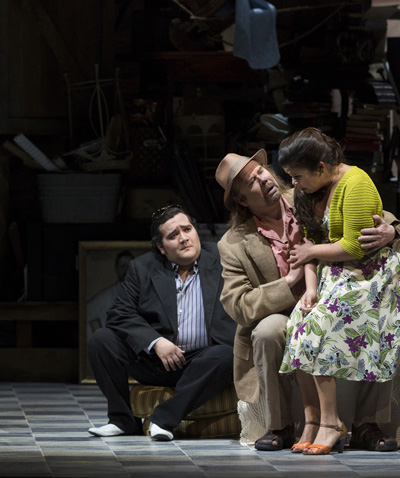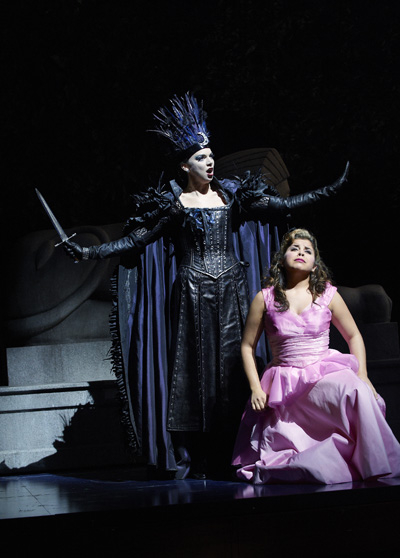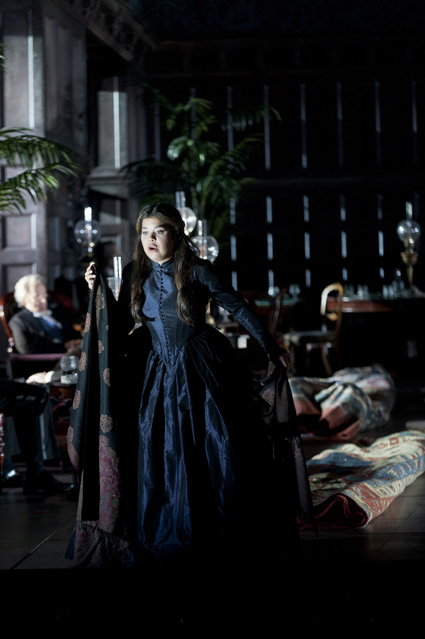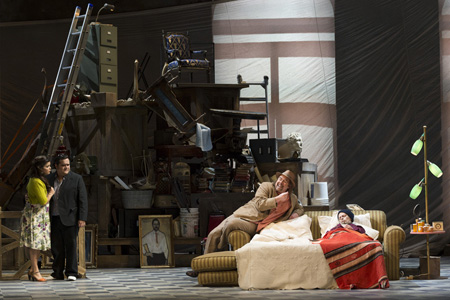-
Artist in Focus: Simone Osborne
By Joseph SoPosted in 2011/2012
[This interview by Joseph So originally appeared in La Scena Musicale. We are republishing it here with his permission]
When Canadian soprano Simone Osborne won the Metropolitan Opera Auditions in 2008, she was all of 21, an extraordinarily young age to be the winner of such an important competition. When I interviewed her for an article in The Music Scene. I was struck by her bright smile, her personal warmth and most of all, her intelligence, and a certain level-headed quality that belies her age. I commented at the time that with her talent and smarts, she has just the right combination for a successful career.
Now four years later, Osborne's career has indeed blossomed. She is on the roster of Columbia Artists Management, a high power agency that has guided many of the greatest artists in classical music. Still in her last year of the Canadian Opera Ensemble Studio, Simone Osborne has already sung several leading roles to positive reviews – Pamina, Gilda, Ilia, Juliette, and now Lauretta. Her triumphal return to Vancouver (her hometown) to sing Juliette garnered ecstatic reviews. Still only 25, she has achieved more than what some singers do in a whole career. Osborne recently took time out from rehearsals of the COC Gianni Schicchi for a chat about her life and her career:
LSM: I recall interviewing you in 2008 for an article in La Scena Musicale when you won the Met Auditions. Since then your career has truly blossomed! You are now on the roster of Columbia Artists, one of the most prestigious artist agencies. We've heard you in major roles the last couple of years – Pamina, Gilda, Juliette, and now Lauretta. Tell us a little about your experiences with singing these wonderful roles.
SO: That interview we did was actually one of the first that I did after winning the Met competition. It's funny but it seems like a lifetime ago and just yesterday, in equal measure. I remember sitting in my mother's living room, chatting with you by phone, answering questions, the whole time in a state of shock. It had not sunk in. In a strange way, I feel the same way today about the last few years. So much has changed, so many experiences have been gained, but it's been a busy four years, and I rarely have time to put it all into perspective.

I do however, have very clear memories of all of these wonderful roles you mentioned. These characters came into my own life at very different times. If I look back at the young woman I was while singing Pamina, I barely recognize myself. I think that is because I discover things about myself, about life and about society, through my explorations of these characters.
As for my experiences singing these roles, I have been utterly spoiled with the circumstances in which I made each of these debuts. The teams assembled for each of the particular shows you mentioned were world class and not only could I have not asked for more, but I couldn't have possibly expected how much I would learn and what I would gain on the stage and off as a result of this work.
With Pamina, I polished my sense of Mozart style with the help of the wonderful maestro Johannes Debus and Kevin Murphy. I learned that sometimes less was more when it came to carving out a character. I realized with Pamina that I had an impulse to turn every role I played into a version of myself – and began to fight that impulse.

With Gilda, I learned that I was capable of a lot more than I gave myself credit for. It is a role that is next to impossible to sing without a strong technique, stamina and frankly – guts! I overcame a lot of challenges in the process of putting her together and was just grateful and proud to make it to opening night. I may have learned as much about myself off the stage on this production as I did on the stage.
Juliette was another test of endurance, pacing and focus. I remember scarfing down a banana between each act (that makes five over the course of the night!) and steeling my mind for another round. But there was also the pacing of the character. Waiting to reveal certain facets of Juliette's persona until they were laid out by Gounod in the score. I felt a strong sense of duty to portray this beloved historical figure to the best of my ability. I must have read the Shakespeare play a dozen times, looking for clues. I was also able to coach the French style with the incredible maestro Jacques Lacombe, coming away with lessons I won't soon forget.
As for Lauretta, I guess we'll have to wait and see...
LSM: If you had to pick one, which one is your favourite?
SO: Oh, come on Jo! That is the closest feeling I know to picking a favourite offspring. Simply not fair. I love them all! Each one is unique and special in its own way.
LSM: Let's talk a little about Lauretta. It seems to be a role tailor-made for you. And of course she has one of the most famous arias in all opera. Tell us a little about Lauretta vocally.
SO: Singing Lauretta feels like slipping on an old glove. It is a new role for me but it seems to fit just right. The aria is relatively indicative of the whole role, if perhaps a bit more delicate (when sung as it is written in the score – and less like a grand diva encore or party piece). In terms of nuts and bolts it is essentially a lyric role with an optional high Db in the finale (which I prefer to think of as a C# – slightly less daunting!). It requires a solid middle voice which has enough cut in it to fight thick orchestration and doubling – like all Puccini soprano roles. That is why Lauretta is one of the only Puccini roles I feel comfortable touching for some time. The reason being that although there is indeed a Puccini-sized orchestra beneath you, Lauretta is supposed to be young and much of the orchestration under her music reflects that. Not to mention – it's short! It's a short piece for every one of the major roles, but especially for Lauretta. I think the longest chunk I sing at one time is about eight minutes. That's a walk in the park compared to Gilda, in a production that went straight through Act II to the end without me leaving the stage! It certainly helps to have a maestro like Sir Andrew Davis leading the way and taking care to bring out the best in each of us. And luckily for me, one of the greatest stage creatures of our time, Catherine Malfitano, tackled Lauretta early on in her career and is full of advice and encouragement.

LSM: How do you approach her character (Lauretta)? How do you compare her to the other women you've played – Gilda and Pamina, for example?
SO: Lauretta is young and head over heels for her first love. And she's a soprano to boot – look out world! But seriously, Catherine and I had discussions early on about how we see her. Our Lauretta is innocent, but smart. In singing the aria she is sincere rather than just working as a master manipulator to get what she wants from her father. However, she is a spunky little thing and is determined to live happily ever after with Rinnucio. I'm grateful Catherine took the time to piece together this layered personality because Lauretta has a much shorter time, less music and text to reveal herself to the audience than say a Gilda or Juliette. Even Pamina has more material to work with. All this means is that I must work hard to create an interesting, three dimensional human being on the stage – rather than a simple caricature.
LSM: What other roles are you working on? Do you have a dream role?
SO: I am working on a lot of Mozart these days and looking forward to singing lots of it in the near future. I am dusting off the cobwebs on things like Susanna, Ilia and Zerlina – all of which I have performed before, and am looking forward to singing again soon. I am also preparing Mèlisande and two new (light!) Verdi roles for the near future.
As for dream roles, things like Manon, Violetta and Mimì are at the top of the list. However, I'll have to wait on each of these for a little while. In fact, I promised my boss at the COC, Alexander Neef, that I would lock my Bohème score in a drawer somewhere and "just forget about it" for a long time...
LSM: What upcoming assignments can you tell us?
SO: Well, after Schicchi closes at the COC, I will spend the summer in Japan, singing all of the soprano roles in a Arthur Honnegar piece at Seiji Ozawa's summer festival in Matsumoto. After that, I come back to Canada for a return to Gilda in a run of Rigoletto performances. Then it's off to Dubai to start a cruise of the Seychelle islands on board a Stella Maris cruise ship where I will represent the COC in a competition featuring young singers from La Scala, the Met, Covent Garden, among others. Following the cruise, I head to Zurich as a soloist in a new production at the 10,000 seat Hallenstadion amphitheatre, called Viva Verdi. And then, it is back to North America, and a return to Carnegie Hall for a gala concert early in the new year.
LSM: Given that you've won the Met Auditions, you've "reached the pinnacle" so to speak. Are competitions behind you now, or would you still want to try your hand in the future?
SO: I don't know about that! I feel as though I'm reaching for the pinnacle every day, with every practice session. And let me tell you – that pinnacle seems quite far in the distance! The Met was an incredible experience that changed the course and speed of my career trajectory in a big way. I am extremely grateful for the support of the Met and for all of the doors that winning that competition opened for me. That is why I want to continue to make choices that allow me to grow as an artist. That way I will hopefully make all of the people who got behind me early on proud one day! I'm sure some people in a similar position might put competitions behind them, but I prefer to remain open to any experiences that might mean growth or new lessons learned.
LSM: At 25, you are still incredibly young, considering how far you've already gone in your career. Where do you see your voice going in the next five or 10 years?
SO: I think I'll let it lead the way. I would love to sing lots of Mozart roles for now and use a young Mirella Freni's repertoire choices as a general guide for my own. Taking things one step at a time, moving like a tortoise rather than a hare, and allowing for a long, fulfilling career as a result would be the dream. I plan on listening to my instrument itself, being vigilant about study, vocalizing, practice, and consistent work with a technician I trust. I think there is a lot of Italian and French repertoire in my future. Looking down the road, there are things like Susanna and Adina today, then the Countess and Manon, Lucia and Violetta down the road, Mimì and Marguerite even further along and then who knows? Tatyana, Marshallin, Butterfly? A girl can dream! But for now, I'll listen to the incredible team of people that I call my trusted "board of directors," follow my gut and listen to my voice. I'll continue to put one step in front of the other, turn down opportunities that may be too much too soon, and keep my eye on the prize – a career and artistry that I am proud of, based on hard work, honesty and respect of this incredible art form.
Top photo: (l – r) René Barbera as Rinuccio, Alan Held as Gianni Schicchi and Simone Osborne as Lauretta in the Canadian Opera Company production of Gianni Schicchi, 2012. Photo: Chris Hutcheson
Second Photo: Ambur Braid as the Queen of the Night and Simone Osborne as Pamina in the Canadian Opera Company production of The Magic Flute (Ensemble Studio performance), 2011. Photo by Michael Cooper.
Third Photo: Simone Osborne as Gilda in the Canadian Opera Company production of Rigoletto, 2011. Photo by Chris Hutcheson.
Bottom Photo: (l – r) Simone Osborne as Lauretta, René Barbera as Rinuccio and Alan Held as Gianni Schicchi in the Canadian Opera Company production of Gianni Schicchi, 2012. Photo by Michael Cooper.
